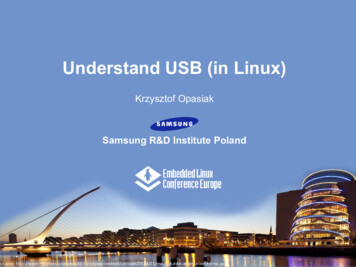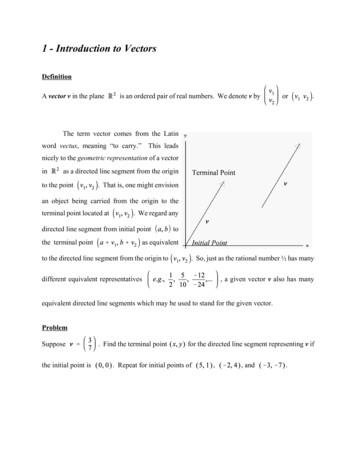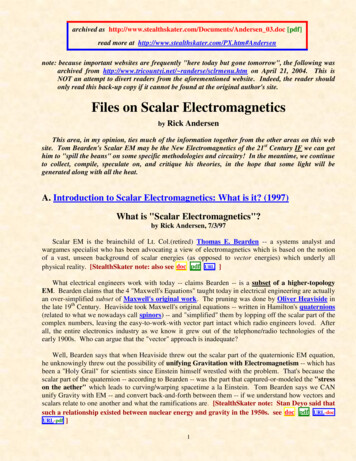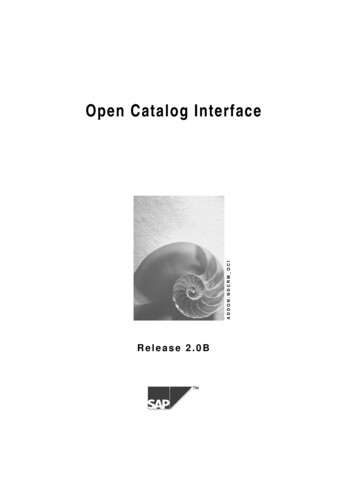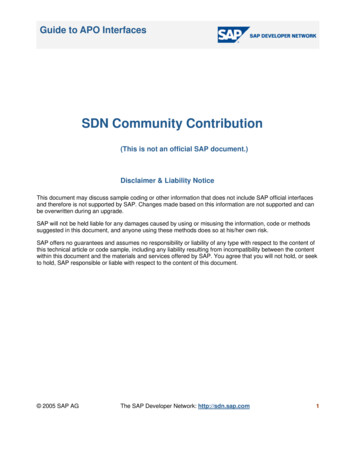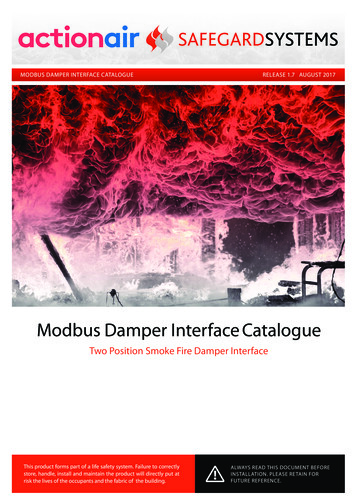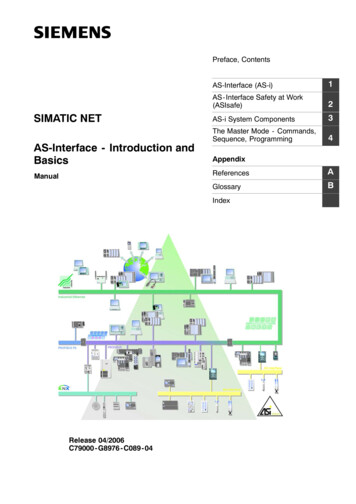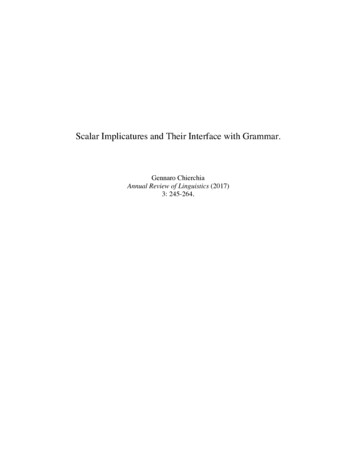
Transcription
Scalar Implicatures and Their Interface with Grammar.Gennaro ChierchiaAnnual Review of Linguistics (2017)3: 245-264.
1. INTRODUCTIONScalar implicatures (SIs) are exemplified as follows:Plausibly, Mary in example 1a,i intends to convey to her guest, John, that he is not required orexpected to bring both wine and dessert (i.e., sentence 1a,ii); in example 1b,i, she intends toconvey that she graded some though not all of the assignments (i.e., sentence 1b,ii). SIs are theprocess whereby words like or and some, which can also have an inclusive interpretation—compatible with and and all, respectively—may come to be construed exclusively (by speakersand hearers alike).1 They are part of the more general phenomenon of quantity-basedimplicatures (QBIs). Another example of a QBI, also associated with or, is the so-calledignorance implicature:2Both SIs and ignorance implicatures have been argued to be derivable from the idea thatspeakers adhere to a so-called maxim of quantity, according to which they are expected toconvey all the relevant information they have evidence for. Grice (1975, 1989) made thisproposal while constructing a beautiful general paradigm on how core/logical interpretationcomes to be pragmatically enriched. Whereas linguists generally agree that Grice's program isfundamental to understanding many forms of pragmatic enrichment, there has been considerabledebate over whether SIs and other QBIs do not instead require substantially more than spellingout Grice's program, and are not in fact rooted in grammar. What is at stake is whether SIs can beviewed as stemming from general principles of rational action (the pragmatic approach) orwhether they are, instead, tied to language-specific computational processes (the grammaticalapproach).3 In this article, I review the key arguments in this debate, and explore why somelinguists have reached conclusions regarding SIs similar to those that Groenendijk & Stokhof(1984, pp. 368–69) reached in connection with the exhaustive interpretations of answers:We are inclined to prefer a pragmatic strategy over the semantic one explored in this paper. Whythen didn't we take this grand route over the summits of Gricean reasoning, where the air is thin,but the view so much clearer? The reason is that we don't see a pass that leads into this promisedland. The informal Gricean reasoning sounds quite appealing. The problem is to make itwork .4
2. GRICE'S LEGACYThe reconstruction of Grice's proposal on SIs and other QBIs that one finds in semantictextbooks (e.g., Gamut 1991) can be reproduced as follows:The derivation of the ignorance implicature is fully parallel modulo the assumption that utteringa disjunction makes the individual disjuncts relevant:
Conclusions 3i and 4i enrich the basic meaning of the uttered sentences, using maxims (likequality, quantity, and relevance) that can be regarded as spelling out a principle of least effort incommunication, and pure logic. There is great beauty in this. One might wish that all forms ofpragmatic enrichment could be derived in a similar way.But, as Groenendijk & Stokhof (1984) asked, is there a pass into this promised land when itcomes to SIs? Notice, in particular, that the reasoning in examples 3 and 4 afford us uniformlyignorance implicatures. The speaker is not sure that Bill will show up, nor that John will showup; and she is not sure that both will show up. This result is perfect for example 2, but it is tooweak for the canonical instances of SIs such as those in example 1. We need a way ofstrengthening result 3i. It may seem like a small step from conclusion 3i to the exclusivenessimplicature; the question is whether things are as they seem.Note that Gricean quantity inferences can be thought of as exhaustivity clauses over the set ofrelevant alternatives. Such inferences are, in other words, equivalent to saying that that the onlythings the speaker believes among the relevant ones are those that have been uttered (thestandard definition of the only operator O is given in example 5c):
Given this equivalence, we can use OALT(p) as an abbreviation for “run the Gricean reasoning onp, relative to ALT.”3. PROBLEMS WITH GRICE'S LEGACYI now turn to issues that make Grice's program problematic for the derivation of SIs.3.1. OpinionatednessTo obtain the desired SI from conclusion 3i, we must assume that the speaker is opinionatedabout the relevant alternatives, in the sense that for each alternative she either believes it to betrue or believes it to be false:Through opinionatedness, we derive from example 3i that the speaker believes that either John orBill, but not both, will show up (i.e., the desired exclusiveness implicature 6b). Opinionatednessseems like an innocent enough assumption.5However, we do not want opinionatedness to apply to the disjuncts individually. Assuming thatthe speaker is opinionated in the sense of definition 6 about all the individual disjuncts wouldimmediately lead to a contradiction. But this restriction on opinionatedness cannot be becauseindividual disjuncts are irrelevant: If disjuncts are not relevant in uttering a disjunction, thenwhat is? So opinionatedness cannot target all the relevant alternatives; it must target selectivelythe strictly scalar ones. Thus, there is something special about scalar alternatives (vis-à-visindividual disjuncts).
3.2. Maxim SuspensionA nice feature of Grice's approach is the way it accounts for the optionality of implicatures: Ifthere are reasons to believe that a maxim (or any auxiliary principle involved in implicaturecomputation) is suspended, then the derivation of the inference is also automatically blocked. Forinstance, if there are reasons to believe that the speaker has relatively little information about therelevant facts (example 7a), or if SIs are patently irrelevant to the conversational goals (example7b), implicatures will not be computed:Similarly, for the maxim of quantity Grice gives the example of a treasure hunt, with the masterof ceremonies uttering “The next clue is either in the garden or in the basement.” Clearly, there isevery reason to think that the maxim of quantity is not being upheld in a treasure hunt context.However, in the latter case (as with opinionatedness), things are surprisingly more complex.Grice's account leads us to expect that as soon as the maxim of quantity is suspended all quantityimplicatures, including the scalar ones, should be blocked, because a premise essential to allQBIs fails to hold. Yet this is not quite what happens. Fox (2014) constructs a simple thoughtexperiment showing that SIs (but not ignorance implicatures) can still be drawn even when themaxim of quantity cannot possibly be operative.6 Imagine a TV show in which money is hiddenin several boxes of a set A, B, C, and so on, and the host is supposed to provide clues toparticipants as to where. In such a situation, the host might utter sentence 8a or 8b, even if shefully knows where the money is:If the host says sentence 8a, the participant might afterward raise objection 9a.Reaction 9a seems perfectly natural and legitimate (and contrasts with reaction 9b). Yet this is aminimal variant of Grice's own illustration of how the maxim of quantity can be called off (seeFox 2014 for a detailed discussion), and without such a maxim we should be unable to draw SIs.Thus, there is a second way in which SIs appear to be special and surprising among implicatures.SIs may persist even when the maxim of quantity is not operative.
3.3. RelevanceHow do we determine what is a relevant alternative? The simplest answer to this dauntingquestion might be that the context (the speaker's communicative intention, the informationavailable to the illocutionary agents, etc.) guides us toward what matters. But, as illustratedabove, things are not quite as free as that. Scalar alternatives (as opposed to, e.g., individualdisjuncts) are selectively targeted by opinionatedness; moreover, scalar alternatives are notautomatically deactivated when the maxim of quantity is called off. On the basis ofconsiderations that overlap those discussed in Sections 3.1 and 3.2, Horn (1989) formulated thehypothesis that Gricean enrichments may have a privileged relationship to what have come to beknown as Horn scales, namely paradigmatic variants of quantity expressions of the followingkind:If we assume that the Gricean reasoning works as in reconstructions 3 and 4 plusopinionatedness, and that Horn scales provide a default setting for what alternatives are to betaken as relevant, we arrive at SIs in a way that still closely resembles Grice's original proposal.This is more or less what has come to be known as the neo-Gricean approach (e.g., Horn 2004).Although the neo-Gricean line of research has been quite fruitful, linguists have known for along time that SIs are not confined to paradigmatic Horn scales. Particularly important in thisdiscussion has been the following pattern, originally put forth by Matsumoto (1995):Whereas sentence 11a in isolation might not have a particularly strong SI, when followed bysentence 11b it robustly triggers SI 11c. This observation prompts three conclusions. First, SI isnot limited to Horn scales. Second, the context may bring scales to salience. And third,syntactically complex items (a little bit more than warm) may qualify, through contextualsalience, as scalemates to morphologically simple items (warm).With that in mind, consider example 12:
Example 12a is natural enough. The complex determiner many or all in the second sentenceseems able to become a contextual alternative to some in the first sentence, forming the scale{some, many or all} as one would expect given Matsumoto's observation, and prompts a notmany SI. Example 12b, by contrast, is strange. Why? On the basis of the neo-Gricean approach,it is not obvious. In fact, example 12b should have a specific implicature. The some in the firstsentence of example 12b should have its basic meaning (compatible with all), and it should forma contextual scale {some, just some} with the complex determiner in the second sentence, whichshould therefore trigger a not just some implicature. Thus, example 12b should ultimately meansomething like “I graded some, though not just some, of my assignments, while Bill graded justsome of his.” In other words, the first sentence should be a roundabout way of saying “I gradedall of my assignments.” But it isn't.Here is another way of stating the problem. Consider or again. A sentence like p or q could haveas an alternative p or q but not both, for that would be relevant, and can be explicitly madesalient in the context. If we run the Gricean reasoning over p or q using as an alternative p or qbut not both, p or q would implicate p and q. This never happens. It is not clear why, on the neoGricean approach. The reason is not that complex scalar expressions cannot count as alternativesto simple ones, for this typically happens in context.7 Yet no amount of contextual priming cancreate scales like {some, just some} or {or, or but not both}. At a descriptive level, the constraintseems to be that alternatives must have the same monotonicity. All Horn scales do; so does thescale {warm, a little bit more than warm}. But the scale {some, just some} does not have auniform monotonicity: some is upward monotone; just some is nonmonotone.The outcome of this discussion is as follows. Horn's idea of having formal constraints onalternatives is a step in the right direction. But (a) it conceptually changes the Gricean picture bylinking it to a formal/grammatical constraint on scales, and (b) it does not explain how thecontext can affect the set of formally defined alternatives. What is clear is that an appeal torelevance per se does not seem to be of great help.3.4. EmbeddingEmbedding presents a further problem for the (neo-)Gricean approach. It seems that SIs can beembedded,8 as demonstrated by downward-entailing (DE) contexts, like the antecedents ofconditionals:When a sentence like example 13a or 13b is uttered out of the blue, some and or are notconstrued exclusively. For instance, sentence 13a is not typically understood as meaning “Ifsome though not all of the students are having difficulties, talk to them.” However, examples 13aand 13b could continue as follows:
These continuations force hearers to essentially embed an exclusiveness implicature in theantecedent of a conditional. And in planning an utterance like sentence 13a with continuation14a, the speaker relies on the rhetorical effect that continuation 14a will have.The existence of embedded implicatures of this sort is not readily consistent with the Griceanpicture. The way in which implicatures are derived in that framework is by reasoning about theutterance as a whole, the speaker's intentions, and so forth. It is supposed to leave thecompositional system intact. And yet the way one would want to interpret sentences 13a and 13bin the context of continuations 14a and 14b is by treating the antecedents of sentences 13a and13b as if they were autonomous utterances, and running the Gricean reasoning on them. Theresult would be as follows:[Recall that OALT(p) is short for “run the Gricean reasoning on p”.] These observations seem tosuggest that one of the main tenets of the Gricean paradigm, namely that the compositionalsystem is “encapsulated” from pragmatic enrichments, has to be weakened.A similar point can be made in connection with contexts that are non-DE, like the so-calledHurford disjunctions.9 It is well known that a disjunction is infelicitous if one of the disjunctsentails the other (example 16a). The only known exception is constituted by sentences withscalar items (example 16b, discussed in Gazdar 1979):The deviance of sentence 16a receives a natural account on the assumption that whenever adisjunction entails another, the former becomes redundant. In contrast, the naturalness ofsentence 16b can be explained in a straightforward manner by assuming that, for instance, thefirst pair of disjuncts in sentence 16b,i, namely (John spoke to) Sue or Bill, is construedexclusively, and therefore the first disjunction does not entail (John spoke to) Sue and Bill. Thesame is true for sentence 16b,ii. But if exclusive interpretations of scalar items come fromimplicatures, this means that implicatures must be added at an embedded level (and, in fact, atthe level of subsentential units).3.5. ObligatorinessQBIs can be canceled, but the ease with which this happens varies. Contrast, for instance,examples 17a and 17b:
In example 17a, the speaker tries to cancel an SI; in example 17b, an ignorance implicature. Theformer seems more natural than the latter. To cancel ignorance implicatures, one has to resort tocontexts of the so-called treasure hunt type.There are many other cases where one may say that a certain piece of meaning is an implicature,but a noncancelable one. Consider, in particular, the meaning associated with plurality.10 Thedenotation of plural noun phrases must include singularities on the basis of constructions such asthe following:The presence of a single cat on the mat would suffice to make sentence 18a false; and if there isa single cat on the mat and the hearer doesn't shoo it away, she will have failed to comply withthe request in sentence 18b. However, in non-DE contexts, the interpretation of plural nounphrases must involve more than one cat:One certainly cannot utter sentence 19a while pointing at one cat, and sentence 19b would befalse (or infelicitous) if one fed only a single cat. It is tempting to analyze this phenomenon as aquantity implicature. The reason that sentences 19a and 19b must be understood as involvingpluralities might be that they compete with their singular counterparts, which are in some sensestronger. For example, sentence 19b might be taken to assert that the speaker fed one or morecats and to implicate “but not just one.” Such an implicature would not arise in DE contexts suchas sentences 18a and 18b because, as is well known, such contexts reverse entailment patterns;therefore, plural forms become stronger than their singular competitors, and no implicaturecomes about. This analysis is highly plausible and arguably explanatory. However, if semanticplurality in non-DE contexts is indeed an implicature, it is not cancelable:Descriptively speaking, the plurality implicature, which naturally “disappears” in DE contexts,seems to be obligatory in non-DE contexts. But the notion of obligatory implicature feels like anoxymoron from a Gricean perspective. Quantity implicatures rely on conversational maxims (andauxiliary assumptions like opinionatedness), and suspension of such maxims should always bepossible.3.6. Free Choice PhenomenaSentences like those in example 21a tend to be interpreted as in example 21b:
Sentences 21a,i–ii have the core/compositional form in formula 22a but are interpreted as inparaphrases 21b,i–ii:This so-called free choice (FC) effect is so robust that some researchers (e.g., Zimmerman 2000)have hypothesized that it is part of the compositional semantics. However, this seemsimplausible, because the FC effect can be canceled, and it disappears, by itself as it were, in DEcontexts:Example 23a seems to remove the FC interpretation from the first sentence, and the semanticinterpretation of the second sentence in example 23b is of the formand not of theform(the latter would yield the much weaker meaning “You are not allowed tohave ice cream or you are not allowed to have cake”). The FC effect extends to existentials undermodals in general. Sentence 24a illustrates the effect with a modal of necessity, and sentence 24bwith an indefinite:Thus, the FC interpretation of modals over disjuncts/existentials has the signature properties ofQBIs: It automatically vanishes in DE contexts, and it is cancelable in upward-entailing (UE)ones. Moreover, it very much “feels like” a quantity implicature: If the speaker knew that Johnmight be home but not at the office, she would surely have said so. Similarly, if I know that youare only allowed to have ice cream, uttering sentence 21a would be dramatically misleading. Buthow does one derive the FC effect from the Gricean reasoning laid out in reconstructions 3 and4, even incremented with opinionatedness? How should the maxims be enriched or modified?What further principles should we call upon?
3.7. First En Route SummaryThe Gricean approach delivers ignorance implicatures for free, so it seemed like a small stepfrom there to SIs: appealing to opinionatedness. But closer scrutiny reveals a host of issues. First,opinionatedness must selectively target scalar alternatives over other alternatives that are clearlyrelevant. Second, there are cases in which the maxim of quantity is clearly suspended and yet weseem able to draw SIs. Third, the choice of alternatives seems to be context dependent but at thesame time strongly constrained by grammar (perhaps, by a monotonicity constraint). Fourth,QBIs can be freely embedded. Fifth, some QBIs appear to be noncancelable. And sixth, there arerobust and widespread QBIs, like the FC one, that have a Gricean “feel” but seem to fall beyondthe reach of the Gricean approach.So we face a dilemma. We can modify and enrich the original Gricean take, so as to try to deriveall of these phenomena and observations. The question is what features of the original Griceanprogram the outcome of this modification will retain, and whether we end up sacrificing a cleanpragmatics to the goal of keeping the semantics simple. Part of the appeal of Gricean pragmaticswas its promise to deliver enrichments of meaning in a way that does not affect thecomputational/compositional semantic system of grammar and relies on general principles ofrational action. This promise could still be kept when it comes to implicatures of a certain kind,for instance, “Who stole the steak? The dog looks happy.” But when it comes to quantityimplicatures, the evidence reviewed in the previous section raises doubts, prima facie seriousones, on the “null hypothesis status” of any straightforward modification of the Gricean approachlaid out in reconstructions 3 and 4. Again, as stated by Groenendijk & Stokhof (1984), “[t]heinformal Gricean reasoning sounds quite appealing. The problem is to make it work.”4. INVOLVING THE COMPOSITIONAL SYSTEMThe phenomenon that Groenendijk & Stokhof (1984) were concerned with was the analysis of(short) answers to questions. Questions are typically requests for complete information, and(short) answers must be construed as exhaustive relative to the answer space:11Notice that this happens even when the answer is disjunctive (and therefore partial). Answer25b,ii clearly indicates (in the absence of explicit clues to the contrary) exclusion of theindividuals who are not mentioned. It is interesting that such an answer does not necessarilyrequire that the disjunction be exclusive, for the following continuation is possible:
Answer 26b clearly requires exclusiveness with respect to the individuals not mentioned, but notexclusiveness of the disjunction as such. This is further evidence of the highly selective characterof QBIs.On the basis of such phenomena, Groenendijk & Stokhof (1984) argue for the presence of anonly-like exhaustivity operator in the semantics of answers. What naturally comes to mind, inview of the considerations in Section 3, is that their proposal might well indicate a strategy fordealing with QBIs in general. This strategy constitutes a significant shift in perspective,according to which QBIs would stem not from principles of efficient communication but ratherfrom an exhaustivity operator present in the compositional system. The compositional systembecomes somewhat more complicated, but the pragmatics may remain simple (and Gricean).This line of inquiry can be developed in several ways, but all of the possible implementationsshare a number of features. First and foremost, there will be exhaustification in the semantics:Hereafter, OALT(p) no longer stands for “run the Gricean reasoning on p relative to ALT,” butinstead for either a rule built into the semantic composition of specific constructions (asGroenendijk & Stokhof 1984 and Chierchia 2004 do) or an operator freely inserted at logicalform (as Chierchia et al. 2011 propose). Second, the alternatives of scalar expressions aregrammatically determined. For example, they can be associated with lexical items and can growrecursively, “stored” in separate semantic dimensions as on the semantics for focus (Rooth1992).12 Each expression α, in other words, has an ordinary value α and a set of alternativevalues α ALT. Alternatives provide the restriction for the operator O, just as focal alternatives dowith the overt counterpart of O, namely only. In particular, scalar terms have Horn scales as theirdefault setting, which can be modified by the context, subject to a monotonicity constraint. Theyalso associate with domain alternatives, such as single disjuncts in the case of disjunction orsubquantificational domains in the case of quantified determiner phrases like some students.Third, optionality must be accommodated. A simple way to do so is to assume that insertion ofthe exhaustification operator O is free. Another way (which can coexist with the optionality ofthe operator) involves “pruning” (i.e., excluding) grammatically determined alternatives on thebasis of contextual considerations.13The analysis sketched above provides us with a baseline approach with the followingcharacteristics. Sentence 27a, for example, has (at least) two parses or logical forms:In concrete cases, the choice between the two parses will be resolved in the same way that anyother kind of ambiguity (lexical or structural) is resolved.Exhaustification of a disjunction relative to individual disjuncts leads to contradiction:
There are a number of possible reactions to this fact. One is to say that in such a case individualdisjuncts are simply ignored or pruned. This would leave ignorance implicatures to the Griceancomponent (which, as we saw, can derive them at no cost). Another possibility is that when acontradiction arises, one can take the speaker's beliefs into consideration and arrive atinterpretations of the following form:This is the ignorance implicature.14 The SI and the ignorance implicature can, of course, coexist:We now have an overall idea of how Groenendijk & Stokhof's (1984) proposal can be extendedto QBIs in general. Before turning to the consequences of this stance with respect to the issuesdiscussed in Section 3, I note that the complication of the compositional analysis considered hereis not far fetched in view of how languages work. Linguists know that languages havephonologically unrealized elements like null pronouns, causativization operators, reflexivizationones, and so on. A case very similar to the one considered here is that of covert distributivity(discussed in Roberts 1987, among many others). A sentence like Sue and Mary ate a pizza has adistributive reading according to which Sue and Mary ate a pizza each. It seems hard to arrive atsuch a reading without assuming that Sue and Mary ate a pizza has as part of its logicalform/semantic interpretation a null counterpart of the distributive operator each. Just as there is anull counterpart of each, there may well be a null counterpart of only.In the remainder of this section, I go over the issues raised in Section 3 in connection with theGricean take on quantity implicatures and see what happens to them under the new proposal.4.1. OpinionatedenessThere is no need or place for opinionatedness in the present approach; rather, one freelyexhaustifies alternative bearers. By a “confidence display,” a speaker can convey that anexhaustified parse is intended.4.2. Maxim SuspensionQuantity implicatures are no longer driven by maxims. The treasure hunt–like context typicallysuspends the maxim of quantity and affects the speaker's and hearer's beliefs accordingly. But itis no longer directly expected that the suspension of the maxim of quantity simultaneously
blocks all quantity implicatures, particularly not SIs. Exhaustified parses relative to scalaralternatives are expected to be available (and possibly appropriate) in such contexts.4.3. RelevanceThe role of relevance is trivialized in favor of grammatically determined alternative sets (muchas in the semantics of focus). The context can prune grammatically determined alternatives whenparticular alternatives lead to contradiction or when they do not affect the communicative goals.The context can also increment alternative sets by picking up complex scalar expressions fromthe surrounding discourse. There is, moreover, a very natural economy constraint that enablesone to derive the observed monotonicity constraint on alternative sets.15 One must assume thatcontextual modification of alternative sets can never be such that OALT(p) q, where q is amember of the set of grammatically determined alternatives to p. For example:16In example 31, we exhaustify John will hire Mary or Sue, pruning one of the disjuncts, namelyJohn will hire Mary. As a result, John will hire Mary or Sue would be interpreted as John willhire Mary, a patently crazy result. The economy condition on exhaustification (ExhaustificationEconomy) rules this interpretation out (because disjuncts are among the formal alternatives todisjunctions). Furthermore, it also rules out the cases discussed in Section 3.3, specifically thefollowing:Exhaustifying the first sentence in 32a relative to the contextually salient scalar alternativescontained in the second sentence leads the first sentence to mean I graded all of my assignments.This interpretation is ruled out by Exhaustification Economy, as all is a formal grammaticalalternative to some.4.4. EmbeddingEmbedded SIs are clearly expected to exist on the present approach. One can freely embed nullcausativization operators, null each, and so on, and there is no reason to expect null only to havea different destiny. Embedding O sometimes leads to strengthening and sometimes toweakening:
Exhaustifying the consequent of a conditional leads to strengthening (example 33c);exhaustifying the antecedent does not (example 33d). It is natural to assume that, if one is goingto use O, one will tend to do so in a way that leads to addition of information (i.e., strengthening)rather than in a way that leads to loss of information (i.e., weakening):Parsing condition 34 explains the pattern observed in Section 3.4 and repeated here:Adding O to the antecedent of sentence 35a leads to weakening. Thus, speakers tend not to do it(and the sentence in isolation is therefore interpreted as If some or all of the students in yourclass ). However, when continuation 35b comes in, the “unmarked” construal of sentence 35abecomes too strong—that is, contradictory. For this reason, one inserts O in the antecedent inorder to arrive at a coherent reading of the whole.In conclusion, O can be freely embedded, modulo parsing condition 34, which accounts in a verysimple way for the preferred distribution of SIs in embedded contexts.4.5. ObligatorinessThe concept of obligatory implicature makes little or no sense from a Gricean perspective, but allkinds of grammatical processes can be optional or obligatory. Some verbs can have direct objects(e.g., eat); some verbs must (e.g., devour). In most constructions, adverbs are optional (Johnmade it versus John made it easily), but in middle constructions they are obligatory (This bookreads easily versus *This book reads). A theory in which QBIs are derived through agrammatical operator leads one to expect that sometimes (e.g., with certain types of alternatives)such an operator might be obligatory.4.6. Free ChoiceIn this subsection, I attempt to explain how the FC effect might be derived as a quantityimplicature in the present s
1. INTRODUCTION Scalar implicatures (SIs) are exemplified as follows: Plausibly, Mary in example 1a,i intends to convey to her guest, John, that he is not required or expected to bring both wine and dessert (i.e., sentence 1a,ii); in example 1b,i, she intends to convey that she graded some though not all of the assignments (i.e., sentence 1b,ii).SIs are the
